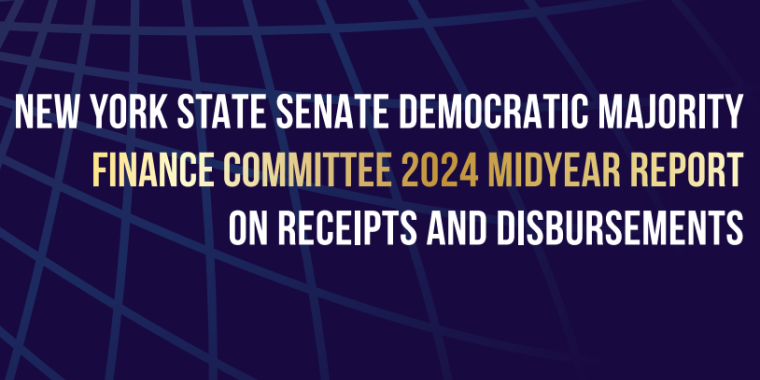
Krueger Unveils Right-of-First-Refusal Legislation To Protect Tenants
New York—In an on-going effort to protect Mitchell-Lama and Project-Based Section 8 affordable housing units, State Senator Liz Krueger today unveiled a bill to give existing tenants a "right-of-first-refusal" should the owner of their development choose to leave these affordable housing programs, and sell the building at market-rate.
Mitchell-Lama and Section 8 affordable housing units are found throughout New York State, including NYC, Buffalo, Albany, Rochester, Syracuse, Westchester and Nassau Counties.
"Owners who choose to sell their buildings after profiting from Mitchell-Lama or Section 8 status leave their tenants facing crippling rent increases," Krueger explained. "Subsidized developments like these were built using a mix of state, local, and federal dollars that came with incredibly low-interest loans for the developers. In return, the developers maintained the units as affordable for a designated period of time—20, 30 or 40 years. Families living there when that expiration date hits are left uprooting their lives."
"Mitchell-Lama and federally-funded Section 8 housing have proven to be New York's most successful housing programs," said Patrick Coleman, HUD Tenant Organizer for Tenants & Neighbors. "The purge of these units has contributed to the affordable housing crisis facing New York. Senator Krueger's bill is vital in order to move away from a model of incentives for developers, to a model that couples those incentives with a regulatory framework designed to ensure the preservation of these units as affordable. What's the point of government investment in affordable housing if that investment just becomes a giveaway to developers, and those affordable units are lost?"
In 2005, New York City passed Local Law 79, which protected Mitchell-Lama and Section 8 tenants' "right-of-first-refusal." However, that law did not withstand court challenges from the Real Estate Board of New York, and was shot down in April 2007 on the basis that the City has no jurisdiction over State law.
"Justice Shafer's ruling made it clear that the State has too-long abdicated our authority when it comes to protecting the very affordable housing programs we have implemented and subsidized," Krueger declared. "Now we have no excuse. We started this program. We funded this program, and we are charged with oversight of this program. It just makes sense to protect our investment in affordable housing complexes."
The federal Section 8 rent subsidy program was created by the U.S. Congress in 1974, and requires low-income tenants to pay 30 percent of their income for rent, and additional monies are paid to the landlord by the government.
The Mitchell-Lama housing program was created in 1955, with new developments continuing to be built into the mid-1970's under a mix of state, local and federal funding. Low-interest loans covering up to 95% of all development costs were made available to developers. The developments came with 20-, 30- or 40-year life-spans, after which these developments could be privatized—when landlords give up tax incentives in favor of market rate rents.
Senator Krueger's bill also protects tenants by ensuring that:
• Tenants are notified of any impending action at least 12-months in advance;
• The Division of Housing and Community Renewal (DHCR) will supervise the value appraisal of the
property, with one appraiser appointed by the owner, one appointed by the tenants, and one agreed
upon by both entities;
• The owner shares legitimate sale offers with tenants who have notified the owner of their intent to
purchase;
• In the event of first-refusal, tenants have the ability to remain in their current residence under the
same circumstance for the longer of six months, or when their lease expires.
"New York State has a history of looking out for developers, but not tenants. While it is not always the best model for tenants to buy and manage a building, if taxpayer dollars went into the development, the tenants should at least have the opportunity to buy the building at a fair cost before the building goes on the market. If the tenants are unable to raise the money, or are simply unwilling to make that level of commitment, the building owner has the right to proceed to the general public. But we believe it is important to give those families most directly affected the first opportunity to purchase," Krueger concluded.



